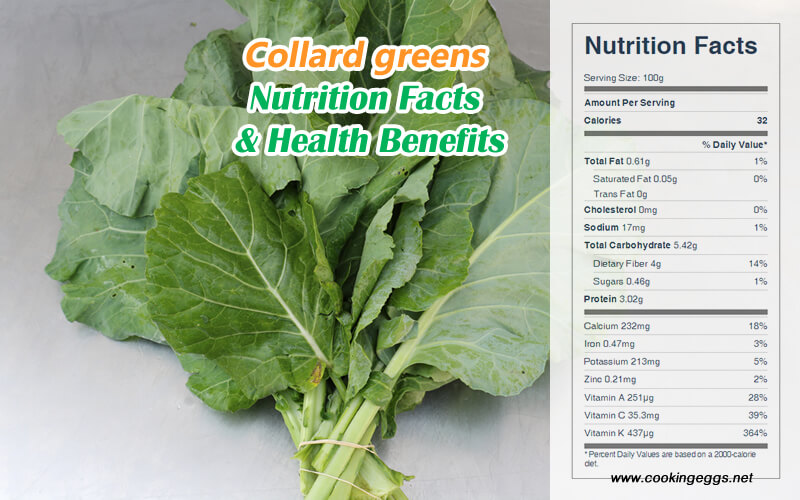Collard greens Nutrition Facts & Health Benefits
Collard greens also known as tree-cabbage or nonheading cabbage, are a cool-season vegetable green that is rich in vitamins and minerals. It is a group of certain loose-leafed cultivars of Brassica oleracea, the same species as many common vegetables, including cabbage and broccoli.
Collard greens have a slightly bitter-pungent flavor similar to that of cabbage. Collards are rich in iron, potassium, sulfur, beta-carotene, vitamin C, folic acid, chlorophyll, and calcium.

The nutritional value of collard greens
Raw collard greens are 90% water, 6% carbohydrates, 3% protein, and contain negligible fat.
Like kale, collard greens contain substantial amounts of vitamin K (364% of the Daily Value) in a 100-gram serving. Collard greens are rich sources of vitamin A, vitamin C, and manganese, and moderate sources of calcium and vitamin B6. A 100-gram reference serving of cooked collard greens provides 32 kcal of food energy. Some collard cultivars may be abundant sources of alphatic glucosinolates, such as glucoraphanin.
One cup of chopped and boiled collards provides 35 calories, 7.8 g carbohydrate, 1.7 g protein, 0.2 g fat, 3.6 g dietary fiber, 3491 IU vitamin A, 15 mg vitamin C, 0.4 mg niacin, 8 mcg folic acid, 168 mg potassium, 20 mg sodium, 10 mg phosphorus, 29 mg calcium, 9 mg magnesium, and 0.20 mg iron.
Collard greens chard Nutrition Facts Label
Health Benefits of Collard greens
Collard greens contain very small amounts of fat and sodium. Their green leaves contain a good amount of soluble and insoluble dietary fiber that helps control LDL cholesterol levels and offers protection against hemorrhoids, constipation, and colon cancer diseases.
Collard greens contain amazingly high levels of vitamin K and provide 364% of the daily value in a 100-gram serving. Research suggests that vitamin K can help to support cardiovascular health and reduce the risk of osteoporosis.
Collard greens are an excellent source of beta-carotene and some vitamin C and calcium. The darker the leaf, the more beta-carotene is provided. Vitamin C is a powerful natural antioxidant that offers protection against free radical injury and flu-like viral infections.
Collard greens are an excellent source of vitamin A and carotenoid antioxidants such as lutein, carotenes, zeaxanthin, cryptoxanthin, etc. These compounds are scientifically found to have antioxidant properties. Vitamin A is also required for maintaining healthy mucous membranes and skin and is essential for healthy vision.
The antioxidants and phytochemicals in collard greens may help to reduce the risk of some forms of cancer and heart disease. As a member of the cruciferous vegetable genus Brassica, collard green is rich in diindolylmethane and sulforaphane, which protect against colon, breast, and lung cancer. They are also found in cabbage, cauliflower, brussels sprouts, bok choy, kale, mustard greens, and watercress.
Health Risk
Collard greens are among a small number of foods that contain measurable amounts of oxalates, so over-consumption can cause problems for those with kidney disease, gout, vulvar pain, rheumatoid arthritis, or other conditions that may require a low-oxalate diet.